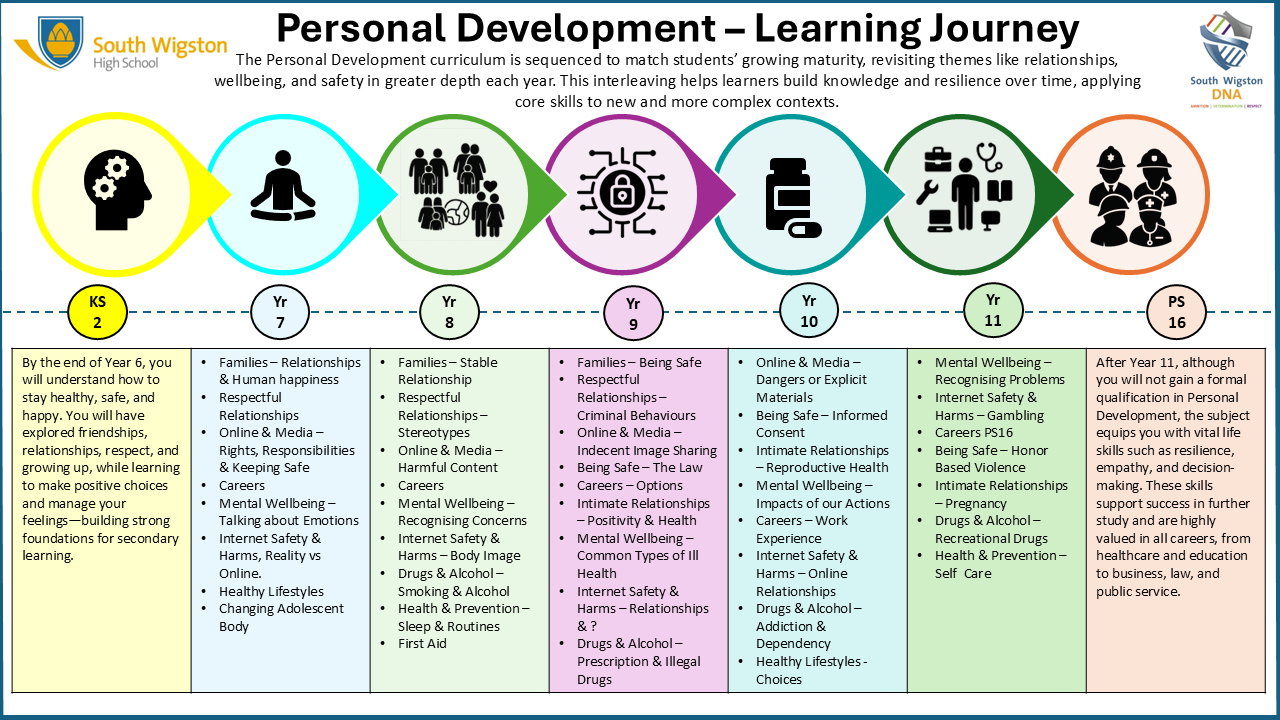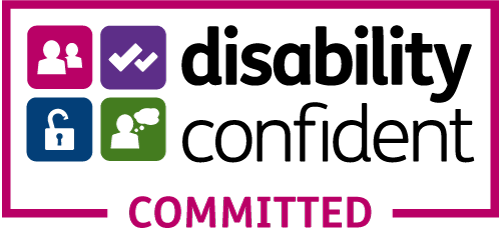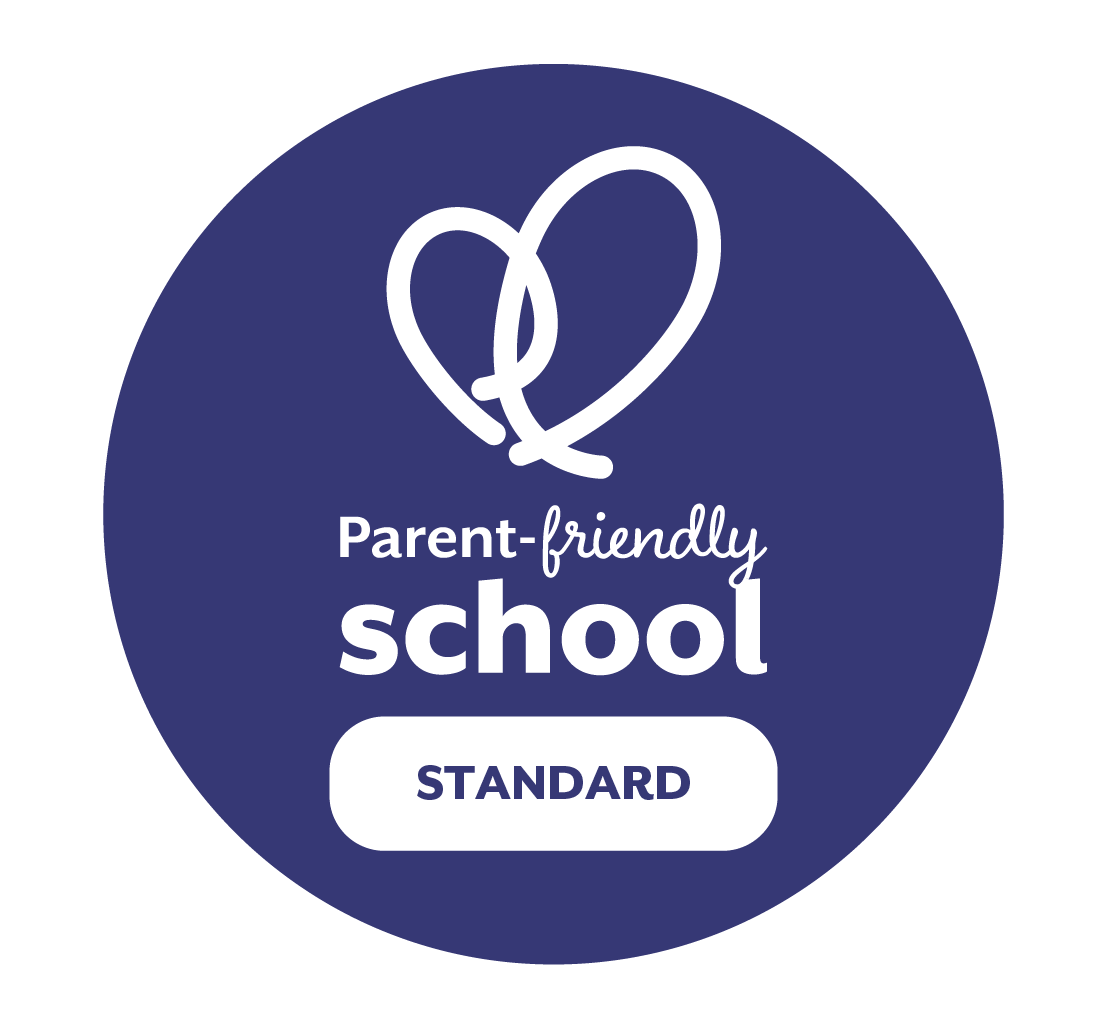Personal Development
Member of staff
Mr M. Chamberlain: Curriculum Lead Personal Development
Mr A. Ellerby: Teacher of Personal Development
Intent
The Personal Development curriculum at South Wigston High School empowers learners to lead safe, healthy, and responsible lives—now and in the future. Rooted in our school values of Ambition, Determination, and Respect, our curriculum aims to:
Inspire Ambition by encouraging students to understand themselves, explore their identity, and strive for personal, academic, and career growth.
Foster Determination by equipping learners with the resilience, confidence, and emotional intelligence to make informed decisions and navigate real-life challenges.
Promote Respect by nurturing inclusive attitudes, empathy, and active citizenship, enabling learners to contribute positively to their relationships and communities.
The curriculum is underpinned by four key progress statements that guide learning from Years 7 to 11:
- LF1: Develop knowledge and understanding of physical and mental health and wellbeing
- LF2: Understand and manage respectful and positive relationships
- LF3: Engage with personal development and life skills
- LF4: Understand rights, responsibilities, diversity, and active citizenship
These statements ensure a coherent and progressive development of learners’ personal, social, and emotional competencies.
Implementation
At South Wigston, Personal Development is delivered through a structured, inclusive, and age-appropriate programme taught fortnightly by trained staff. The curriculum is enriched by assemblies, external speakers, and drop-down days. Lessons are interactive, discussion-based, and designed to reflect real-world issues.
Across both Key Stages, our curriculum develops progressively in line with the PSHE Association’s Programme of Study and statutory RSHE guidance.
Key Stage 3 (Years 7–9)
Learners begin to explore key themes across the three core strands: Health and Wellbeing, Relationships, and Living in the Wider World. Emphasis is placed on transition, emotional literacy, and developing identity.
Year 7 include topics that cover self-awareness, managing emotions, understanding friendship and diversity.
Year 8 include topics that cover understanding of mental health, consent, online safety, and social identity.
Year 9 include topics that cover complex issues like prejudice, risky behaviours, and digital influence.
Key Stage 4 (Years 10–11)
Learners engage with mature and complex issues to prepare for life beyond school. The curriculum focuses on personal responsibility, future planning, ethical dilemmas, and contributing to society.
Year 10 includes topics like sexual health, financial literacy, careers education, and managing relationships.
Year 11 supports learners in transition to adulthood, focusing on emotional wellbeing, future choices, and active citizenship.
Across all years, lessons are mapped to LF1–LF4 progress statements to support consistent assessment of personal development. Each student’s learning journey reflects increasing maturity, critical thinking, and real-life application.
Impact
By the end of Key Stage 4, students will:
Demonstrate secure understanding of physical and emotional wellbeing (LF1)
Model respectful and responsible behaviours in relationships (LF2)
Show ambition, resilience, and leadership in their personal development (LF3)
Act as informed, empathetic citizens who value diversity and engage with society (LF4)
The impact of the PSHE curriculum is measured using:
Learner voice: Feedback, surveys, and focus groups
Staff feedback: Lesson evaluations and observations
Assessment of progress using the Emerging–Mastering descriptors for LF1–LF4
Safeguarding and behaviour data: Monitoring trends linked to wellbeing and conduct
External validation: Feedback from visiting agencies, local organisations, and Ofsted
Through this approach, learners are prepared for life as confident, respectful, and thoughtful individuals—fully embodying the South Wigston DNA.
Key Stage 3 Progress Statements
ks3 personal development progress statements .pdf
Key Stage 4 Progress Statements
ks4 personal development progress statements.pdf
Your Personal Development Learning Journey through South Wigston








 ↑
↑

